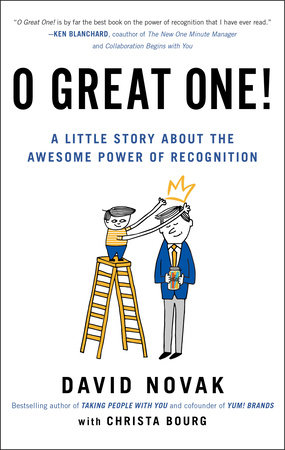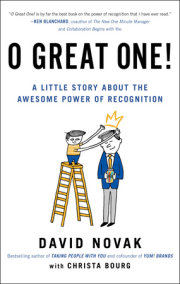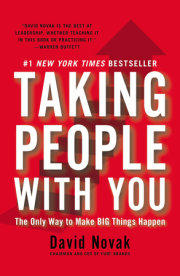Introduction
O Great One!: The Story OGO—short for O Great One— is the name my grandkids have called me ever since they could talk. It may sound over the top to some, but it came about because when my daughter was pregnant with her first child, I didn’t want to be called grandpa, poppy, or any of the usual names. I wanted something a bit more fun and different. How OGO finally came to me is something I will tell in the coming story, but over the years, people always laughed when they heard the name. It was also easy for my grandkids to say, so it stuck.
Since then, OGO has become much, much more than just a nickname my family calls me. It has come to represent something I’ve practiced and encouraged throughout my entire life: the awesome power of recognition.
O Great One! is a story about that powerful force. It centers on a guy named Jeff Johnson, who becomes CEO of the Happy Face Toy Company, an organization that’s in dire shape when he arrives. Because he’s new to the job, and even new to the industry, he’s left scrambling and not sure what to do about the company’s ever- sinking sales. That is, until a surprise gift from his grandson helps him discover that in his organization, recognition has been the missing ingredient that will turn things around— for him, for his team, and for Happy Face Toys as a whole.
I wanted to tell this story because I’ve seen how impactful recognition can be. I’ve also witnessed how devastating it can be when it’s absent from the life of an individual, a team, and even a large organization. Often people think of recognition as the kind of fluffy feel- good stuff that businesses talk about to try to make their employees happy. But if used right, it does a whole lot more than that. Simply put: if you give people the recognition they’ve
earned, if you show
genuine appreciation and acknowledge the unique things people have to offer, then you will drive real results. And at the same time, you will lift the spirits of everyone involved. It really does feel good to receive recognition, and it feels every bit as good to give it— often even better.
Considering that recognition can have such a hugely positive effect, it’s amazing to me that it’s still vastly underused in business, and also in life. I think that’s a crime. As you’ll see in this story, making use of recognition is not hard, it’s not expensive, and you don’t need an MBA or even a position of authority to do it.
I know this is true because I’ve seen it in action as my team and I built Yum! Brands into one of the world’s largest restaurant companies. It operates in 125 countries and employs nearly 1.5 million people. So I’ve not only seen recognition work, I’ve also seen it work on a grand scale
with people from different walks of life all around the world. In fact, the story you are about to read is based on real-world experiences I’ve had throughout my career as the leader of this mammoth organization.
This story comes from my personal experience, but that doesn’t mean you have to be the leader of a big company to reap the benefits. Recognition works for the leader of a small team just as well as it does for the chairman of a large enterprise. It works for an individual who isn’t in a leadership position at all. It works outside of business for parents, teachers, community groups, sports teams, and everyone else. The important thing to understand about recognition is that it’s simply good for people—
all people— no matter who they are, what they do, or where they come from.
If there’s one message I hope you will take away from this book it’s that no matter who you are or what you do,
you have the power to use recognition to make a difference in people’s lives each and every day. You have the power to show people that someone is watching, that someone cares, and that what they do really matters. You have the power to help individuals, teams, and organizations reach their potential. Whether you’re trying to affect the bottom line of a Fortune 500 company or the quality of life of your children, the prescription is the same. If you use recognition on a regular basis, you can inspire people to do great things. And the personal satisfaction you’ll receive as a result, when you see others reach their full potential with your help . . . well, that’s when the real magic kicks in.
O Great One! is for anyone who wants to motivate people, get results, and feed the soul. And really, who wouldn’t want to do all that? Especially because it all comes down to something that’s relatively simple to implement and use.
As far as I’m concerned, the only real question is:
Why aren’t people using recognition more?
Copyright © 2016 by David Novak with Christa Bourg. All rights reserved. No part of this excerpt may be reproduced or reprinted without permission in writing from the publisher.









